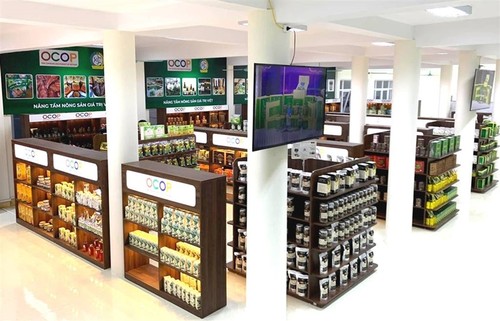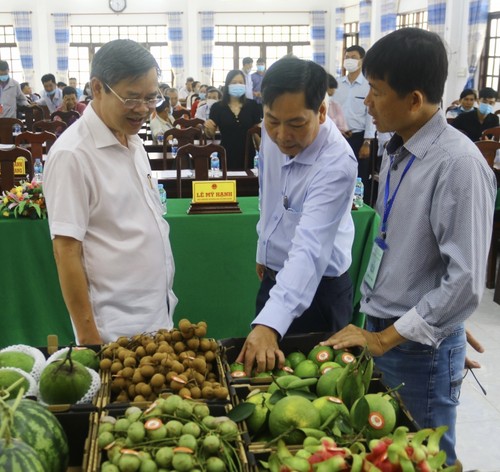 A showroom displaying Son La’s OCOP products (Photo: Le Hong) A showroom displaying Son La’s OCOP products (Photo: Le Hong) |
Son La is a key northern agricultural hub with 84,000 hectares of fruit trees that produce approximately 450,000 tons of fruit per year. Its 24 agricultural products have been granted the Protected Geographical Indication (PGI) certificate.
More than 4,800 hectares of fruit trees in Son La have received 220 growing area codes for export production and Son La has developed 235 supply chains for safe agricultural and aquatic products.
To date Son La has 80 OCOP products, including fresh and processed agricultural products, beverages, and products made of medicinal plants, cotton and other fibers, wood, rattan, metal, ceramics, and textiles.
Nguyen Thanh Cong, Vice Chairman of the provincial People's Committee, said, “The OCOP program has encouraged Son La to restructure its agricultural production toward large-scale commodity production. Its achievements so far have helped Son La to attract further investment in its agricultural sector.”
Farmers in Hau Giang province have shifted to plants and animals better suited to the local climate and soil, have established cooperatives to share techniques and raw material areas, applied high-tech to boost productivity and quality, and sought stable markets.
 Fruit products of Bio Fruit Co-op (Photo: VOV) Fruit products of Bio Fruit Co-op (Photo: VOV) |
The Bio Fruit Co-op in Nga Sau town, Chau Thanh district, has helped many local farmers increase their income by producing better quality products and stabilizing their output.
In the next 5 years the Co-op intends to expand its export market and its GlobalGAP growing areas and obtain more growing area codes.
Truong Canh Tuyen, Vice Chairman of the provincial People's Committee, said Hau Giang authorities have adopted mechanisms and policies to help farmers and cooperatives develop OCOP products as part of the new-style rural building program.
“The Bio Fruit Co-op has worked with the provincial authority in implementing the OCOP program. In the future, we’ll assign each locality 4 or 5 OCOP products each year, with priority given to local agricultural products. We’ve suggested that the authorities of districts, towns, and cities help people respond constructively to the program. We’ll provide maximum mechanism and policy support for developing OCOP items,” said Tuyen.
A two-day trade fair called "Meeting Gia Lai–Japan 2022" for domestic and foreign enterprises was held in Gia Lai province to introduce and sell local OCOP goods from the Central Highlands region to Japanese consumers. The fair was part of activities to mark the 90th anniversary of the province’s establishment.
Duong Minh Tu, of Quang Ngai’s Center for Industrial Encouragement and Trade Promotion, said, “At this fair, the Quang Ngai Department of Industry and Trade introduced 20 OCOP products and other typical rural products at the national level. People like OCOP products because they are characteristics of their region. Some customers buy once and then come back a second and third time.”
OCOP products have changed people's perception of the new-style cooperative model and have helped Vietnamese farmers unlock the potential and advantages of their locality.